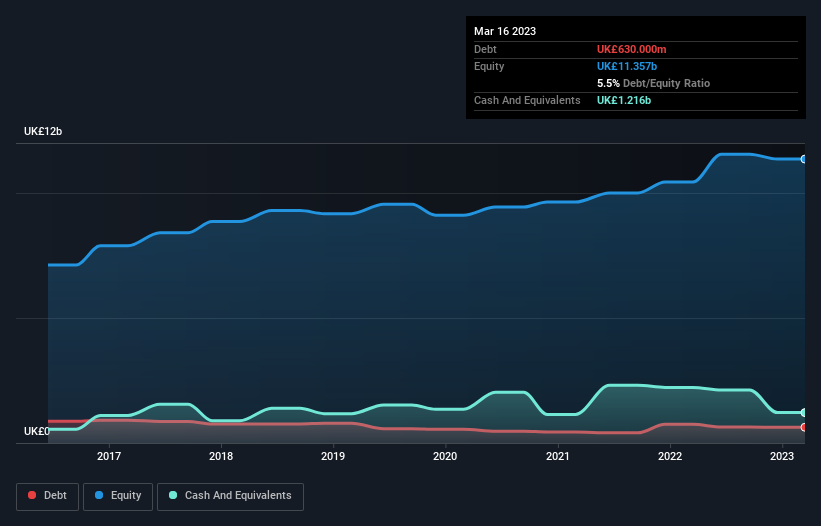
Some say volatility, rather than debt, is the best way to think about risk as an investor, but Warren Buffett famously said that 'Volatility is far from synonymous with risk.' When we think about how risky a company is, we always like to look at its use of debt, since debt overload can lead to ruin. We can see that Associated British Foods plc (LON:ABF) does use debt in its business. But should shareholders be worried about its use of debt?
Why Does Debt Bring Risk?
Debt assists a business until the business has trouble paying it off, either with new capital or with free cash flow. Part and parcel of capitalism is the process of 'creative destruction' where failed businesses are mercilessly liquidated by their bankers. While that is not too common, we often do see indebted companies permanently diluting shareholders because lenders force them to raise capital at a distressed price. Of course, the upside of debt is that it often represents cheap capital, especially when it replaces dilution in a company with the ability to reinvest at high rates of return. When we think about a company's use of debt, we first look at cash and debt together.
View our latest analysis for Associated British Foods
How Much Debt Does Associated British Foods Carry?
The image below, which you can click on for greater detail, shows that Associated British Foods had debt of UK£630.0m at the end of March 2023, a reduction from UK£748.0m over a year. However, it does have UK£1.22b in cash offsetting this, leading to net cash of UK£586.0m.

How Healthy Is Associated British Foods' Balance Sheet?
We can see from the most recent balance sheet that Associated British Foods had liabilities of UK£3.72b falling due within a year, and liabilities of UK£4.04b due beyond that. Offsetting this, it had UK£1.22b in cash and UK£1.89b in receivables that were due within 12 months. So its liabilities total UK£4.66b more than the combination of its cash and short-term receivables.
While this might seem like a lot, it is not so bad since Associated British Foods has a huge market capitalization of UK£14.9b, and so it could probably strengthen its balance sheet by raising capital if it needed to. However, it is still worthwhile taking a close look at its ability to pay off debt. Despite its noteworthy liabilities, Associated British Foods boasts net cash, so it's fair to say it does not have a heavy debt load!
The good news is that Associated British Foods has increased its EBIT by 3.6% over twelve months, which should ease any concerns about debt repayment. There's no doubt that we learn most about debt from the balance sheet. But ultimately the future profitability of the business will decide if Associated British Foods can strengthen its balance sheet over time. So if you're focused on the future you can check out this free report showing analyst profit forecasts.
Finally, a company can only pay off debt with cold hard cash, not accounting profits. While Associated British Foods has net cash on its balance sheet, it's still worth taking a look at its ability to convert earnings before interest and tax (EBIT) to free cash flow, to help us understand how quickly it is building (or eroding) that cash balance. Over the most recent three years, Associated British Foods recorded free cash flow worth 58% of its EBIT, which is around normal, given free cash flow excludes interest and tax. This cold hard cash means it can reduce its debt when it wants to.
Summing Up
While Associated British Foods does have more liabilities than liquid assets, it also has net cash of UK£586.0m. So we don't have any problem with Associated British Foods's use of debt. The balance sheet is clearly the area to focus on when you are analysing debt. However, not all investment risk resides within the balance sheet - far from it. To that end, you should be aware of the 1 warning sign we've spotted with Associated British Foods .
At the end of the day, it's often better to focus on companies that are free from net debt. You can access our special list of such companies (all with a track record of profit growth). It's free.
New: Manage All Your Stock Portfolios in One Place
We've created the ultimate portfolio companion for stock investors, and it's free.
• Connect an unlimited number of Portfolios and see your total in one currency
• Be alerted to new Warning Signs or Risks via email or mobile
• Track the Fair Value of your stocks
Have feedback on this article? Concerned about the content? Get in touch with us directly. Alternatively, email editorial-team (at) simplywallst.com.
This article by Simply Wall St is general in nature. We provide commentary based on historical data and analyst forecasts only using an unbiased methodology and our articles are not intended to be financial advice. It does not constitute a recommendation to buy or sell any stock, and does not take account of your objectives, or your financial situation. We aim to bring you long-term focused analysis driven by fundamental data. Note that our analysis may not factor in the latest price-sensitive company announcements or qualitative material. Simply Wall St has no position in any stocks mentioned.
About LSE:ABF
Associated British Foods
Operates as a diversified food, ingredients, and retail company worldwide.
Flawless balance sheet, undervalued and pays a dividend.

